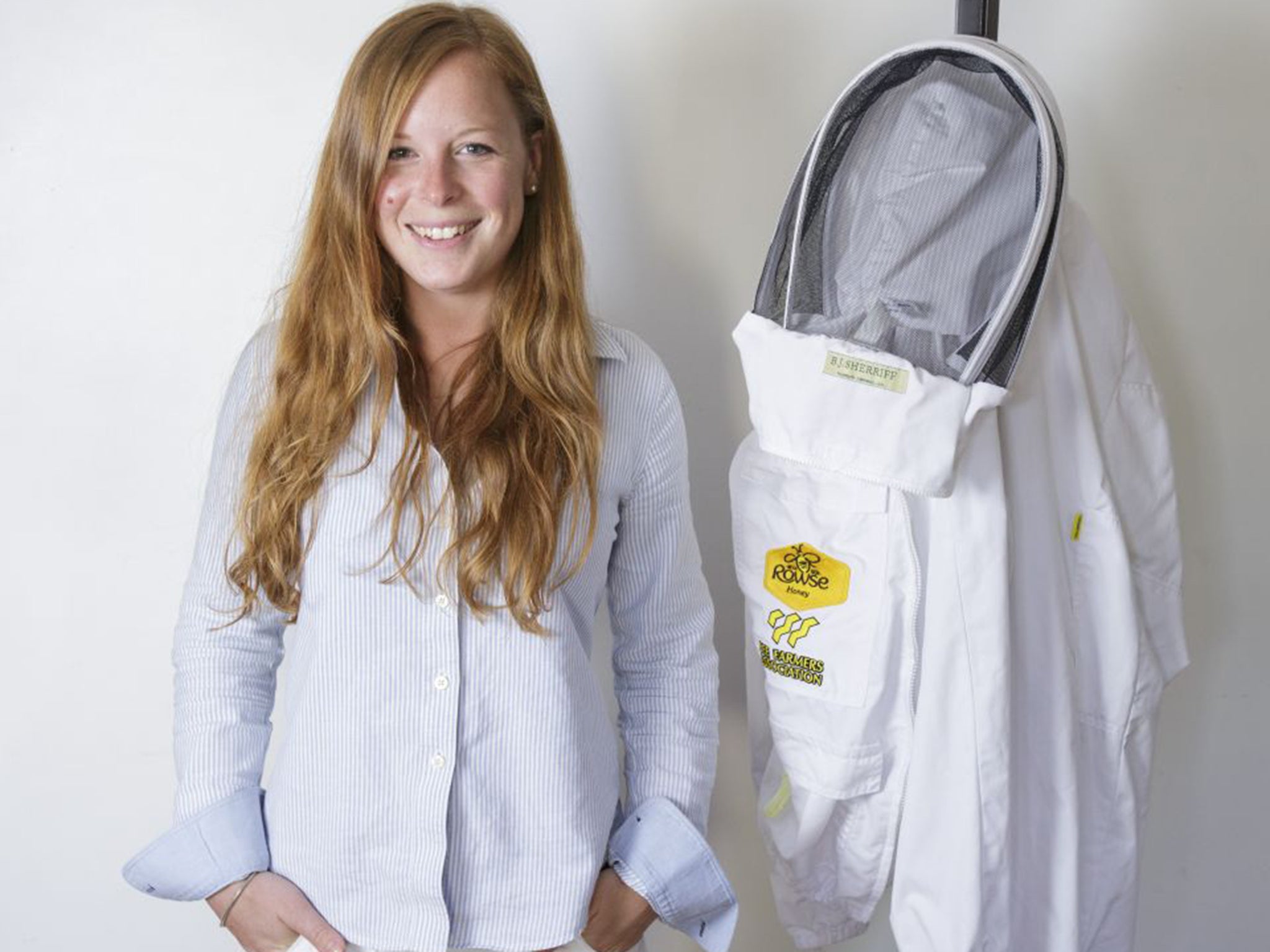Rebecca Marshall: Meet the world's first apprentice bee farmer
The average age of a British bee farmer is 66, but a new scheme is getting young apprentices involved - Karen Attwood talks to Rebecca Marshall

I’m walking gingerly through a bee farm with the sound of a million honey bees buzzing in my ears. It’s so loud that I feel as if I’m in a horror film – and my instinct is to run for it when several insects fly too close to my protective headgear.
I’ve come to see bee producer Rebecca Marshall in action. She assures me that her livestock has been reared to be “chilled out”. Twenty minutes later, I put my gloved hand in among the insects to scoop out and taste the honey.
Rebecca is the world’s first apprentice bee farmer, according to the commercial Bee Farmers Association (BFA), which set up the scheme to help arrest a decline in the industry. The average age of a UK bee farmer is now 66 and the number of beehives has declined by 73 per cent, falling from a million hives in 1900 to just 270,000 in 2015. There are fewer than 100 members of the BFA who work full time in the industry and the UK produces just 14 per cent of the honey it consumes compared to a European average of 60 per cent.
Rebecca, 25, is in her second year of the apprenticeship, which she is undertaking at her father, Ged’s, farm at Steeple Claydon, Buckinghamshire. The training includes a two-and-a-half-month placement in Australia and New Zealand and residential courses in East Surrey.
The job suits her, she says, because she loves “being outdoors and I’m fascinated by nature and how the whole system works”.
“My dad is 59, so he is young in this industry,” she laughs. “If we didn’t have this scheme, perhaps in 20 years you would not be able to buy British honey on the shelf. This is completely different from New Zealand, where there are lots of young people involved.”
The three-year programme, open to 16- to 24-year-olds, is currently calling for new applicants.
Margaret Ginman, from the BFA, said the scheme would teach apprentices “how to play a key role in the understanding of honey bees, the importance of pollination to the food we eat, the improvement of bee health, as well as increasing the production of a wonderful natural product”. Ian Ainsworth, managing director at Rowse Honey, which sponsors the scheme, hoped it would help “stem the decline seen in honey bees over the past few years”.
A third of our food would not be available without pollination from bees. In the UK, about 70 crops are dependent on bees and the economic value of both honey bees and bumblebees as the pollinators has been estimated as somewhere in excess of £200m a year, according to the British Beekeepers Association.
Yet despite the importance of pollinating insects, numbers continue to fall. The decline of the honey bee is due to a number of factors, including diseases and the Varroa destructor parasite which has infested many hives in the UK. Bumblebees, on the other hand, are not affected by the varroa mite, but have declined due to loss of habitat and the use of pesticides. A report published this week linked the decline in bumblebees to rising global temperatures due to climate change.
Donning our white suits to visit the hives, Rebecca jokes that we “look like we’re in Breaking Bad”, while her father takes this moment to inform me that bees “do sting through the suits although we don’t tell people that”. Rebecca gets stung about once a week, although she no longer gets a reaction, but her mother, Sheila, who also runs the business, stopped working with the bees when her children were young because she reacted badly to the stings. Later, in the extractor room, the smell of honey is overpowering. It is here where the wax capping is removed from the honeycomb and the honey is extracted. The room is kept warm so that the honey doesn’t crystallise.
Rebecca says one of the initial attractions of bee farming, which runs from April to October, is that it fits in with the ski season, and that means she can combine working in a ski chalet in the winter with a summer at the farm. She enjoys working with her father, a Master Beekeeper, who became a full-time farmer in 1989, and she would like to continue in the family business.
“I first got involved for him, but then I started to get really into it,” she says. “I realise how hard my dad has worked to get where he is. When he retires, he’ll have been working for 40 or 50 years to build this up; it would be a shame to sell it off.”
Subscribe to Independent Premium to bookmark this article
Want to bookmark your favourite articles and stories to read or reference later? Start your Independent Premium subscription today.

Join our commenting forum
Join thought-provoking conversations, follow other Independent readers and see their replies